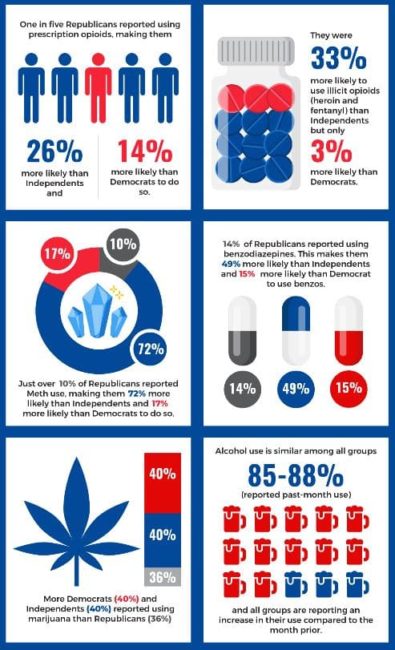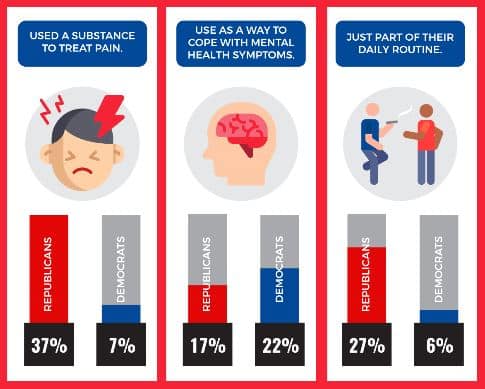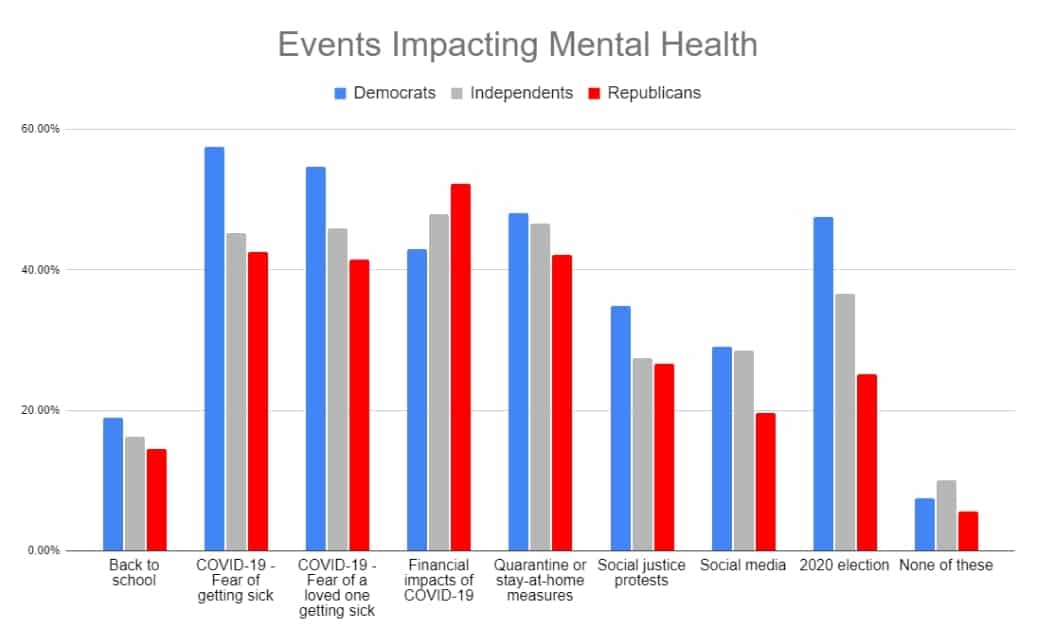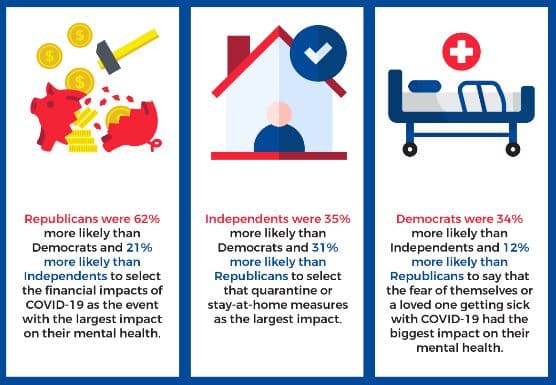Democrats & Republicans are Handling ‘Election Stress’ Differently
With the election season reaching its peak, we surveyed 1,000 people to see how the events of 2020 are impacting their mental health and substance use. The results were striking when we looked at the differences between party affiliations and how members are handling stress.
Survey: 2020 Election Weighing on Democrats’ Mental Health; Republicans Turning to Drugs & Alcohol at a Higher Rate to Cope with Stress
This year has brought unexpected challenges and unprecedented action to all of our lives. The COVID-19 pandemic has disrupted nearly all aspects of daily life and has claimed the lives of over 200,000 Americans. The murder of George Floyd and the renewed calls and demonstrations for social justice that followed shocked and galvanized the nation and the world. An emerging conversation about the mental health effects of social media intensified with the release of the popular documentary “The Social Dilemma.” All of these events are also taking place against the backdrop of a fiercely contested general election.
These events, which have dominated the media landscape, combined with long-term uncertainty can create stress, anxiety and other mental health impacts. They can also cause people to lean on unhealthy coping strategies, like substance use.
We’ve been conducting research to better understand what’s affecting mental health and substance use in our communities and which events have been most impactful. With election season reaching its peak, we also wanted to take a look at how members of political parties are experiencing the events of 2020. The results showed that many respondents reported higher rates of drug and alcohol use, as well as mental health symptoms. The results were even more striking when we looked at the differences between party affiliations and how members are handling stress and coping with COVID-19. Here’s what we found.

Click to see, share or download the full infographic.
The Recovery Village Survey Results
We surveyed 1,000 people about their mental health and past-month drug and alcohol use.
Note: Some questions asked respondents to select each option that applied, so in a few instances, the total percentage will be greater than one hundred.
Republicans Report Drug Use at Higher Rates than Independents or Democrats
Survey respondents who identified themselves as Republicans reported drug use at a higher rate than their Democratic or Independent peers. The most significant differences in the rates were between Republicans and Independents.
- One in five Republicans reported using prescription opioids, making them 26% more likely than Independents and 14% more likely than Democrats to do so.
- They were 33% more likely to use illicit opioids (heroin and fentanyl) than Independents but only 3% more likely than Democrats.
- Just over 10% of Republicans reported Meth use, making them 72% more likely than Independents and 17% more likely than Democrats to do so.
- 14% of Republicans reported using benzodiazepines. This makes them 49% more likely than Independents and 15% more likely than Democrat to use benzos.
- Another 14% reported using prescription stimulants, making them 44% more likely than Independents and 23% more likely than Democrats to do so.
- All parties reported an uptick in their drug use with 44% of Republicans, 37% of Democrats, and 30% of Independents reporting a past-month increase.
- More Democrats (40%) and Independents (40%) reported using marijuana than Republicans (36%).
- Alcohol use is similar among all groups (85-88% reported past-month use) and all groups are reporting an increase in their use compared to the month prior.
- Reported Republican rates of increase are slightly higher (9%) than their Democratic peers and are 42% higher than the rate of Independents. Republicans were also 18% more likely than Democrats and 40% more likely to Independents to report they had previously been diagnosed with or treated for a substance use disorder.
Using Substances to Cope
Survey respondents were asked to select the reasons for their substance use. They were also asked to identify the biggest reason behind their past-month use. More than six in ten across all groups said coping with stress was one reason for substance use, but coping with mental health symptoms, boredom and recreational use were also popular responses. There were differences between the groups as well.
- Republicans were 37% more likely than Independents and 7% more likely than Democrats to say they used a substance to treat pain. They were also 95% more likely than Independents and 20% more likely than Democrats to say they were physically dependent.
- Democrats were 22% more likely than Republicans and 17% more likely than Independents to report substance use as a way to cope with mental health symptoms.
- Independents were 27% more likely than Democrats and 6% more likely than Republicans to say their substance use was just part of their daily routine.
Mental Health Under Siege: A Pandemic, an Election & Social Media are Hurting Mental Health
Majorities across all groups agreed that COVID-19 had impacted their mental health. While symptoms of anxiety, depression and anger were reported at similar rates across groups, Democrats were 20% more likely than Republicans and 8% more likely than Independents to report sleep issues.
This year has brought together a myriad of circumstances with the potential to harm mental health. While each group reported a number of factors impacting their mental health, many of these seem to be affecting Democrats more than Republicans or Independents.
- Almost 60% of Democrats reported the fear of getting sick from COVID-19 has impacted their mental health, making them 35% more likely than Republicans and 27% more likely than Independents to do so.
- 55% of Democrats say their mental health was impacted by the fear of a loved one getting sick, compared to 41.5% of Republicans and 46% of Independents.
- Nearly half of Democrats said the 2020 election has impacted their mental health, making them 89% more likely than Republicans and 30% more likely than Independents to do so.
- Democrats were 31% more likely than Republicans and 27% more likely than Independents to say social justice protests impacted their mental health.
When asked to identify the biggest stressor on their mental health:
- Republicans were 62% more likely than Democrats and 21% more likely than Independents to select the financial impacts of COVID-19 as the event with the largest impact on their mental health.
- Independents were 35% more likely than Democrats and 31% more likely than Republicans to select that quarantine or stay-at-home measures as the largest impact.
- Democrats were 34% more likely than Independents and 12% more likely than Republicans to say that the fear of themselves or a loved one getting sick with COVID-19 had the biggest impact on their mental health.
- Democrats were also 308% more likely than Republicans and 86% more likely than Independents to identify the 2020 Election as having the largest impact on their mental health.
What the Results Mean
Regardless of why, U.S. adults are more stressed and anxious as a result of the coronavirus pandemic and other events that are currently taking place. As COVID-19 persists and the 2020 election continues to intensify, access to mental health care and substance use treatment will become even more critical for overall health and wellbeing.
When asked about current participation or consideration of therapy:
- 34% of all respondents were “considering it.”
- Republicans were 14% more likely than Democrats and 68% more likely than Independents to be in therapy prior to the COVID-19 pandemic.
- Democrats were 24% more likely than Republicans and 26% more likely than Independents to be currently considering therapy.
- Only 8% of respondents reported that therapy “was not an option at this time.”
- Republicans were 10% more likely than Democrats and 25% more likely to Independents to report they have been diagnosed with or treated for a mental health disorder.
These results show there is still work to do to encourage those seeking treatment and connecting everyone with the resources they need. Therapeutic intervention is an important way to treat mental health symptoms as well as underlying causes of substance use. The same way you don’t have to hit rock bottom to get help for addiction, you don’t have to wait until you’re in crisis to get mental health help. Those considering treatment can significantly improve their daily lives and reduce symptoms by participating in mental health counseling.
As a behavioral health care provider and leader in addiction and mental health treatment, we are dedicated to raising awareness and expanding access to high-quality treatment. We serve our local communities at our facilities located around the country and through telehealth options for those who are unable or uncomfortable with traveling. Helping individuals to manage their mental health and break patterns of substance use is not only a critical way to repair families, it also supports the overall health and wellbeing of our communities.
If you or someone you know needs support with substance use or mental health concerns, The Recovery Village can help. We offer a full continuum of care, including telehealth for ongoing outpatient treatment and teletherapy for substance use and mental health conditions. Contact us to learn more about a personalized treatment plan that can meet your needs and get you started on the path to recovery.
For press inquiries about these results and other survey data, email [email protected].
Our Other COVID-Related Studies:
- Survey Shows Drug and Alcohol Use on the Rise During COVID-19 Pandemic
- Mental Health in the Time of COVID-19
- Kids Anxious About Going Back to School After COVID
- South Florida Residents Experiencing “Coronavirus Anxiety” as Pandemic Lingers On
- Young Adults Turning to Drugs & Alcohol to Cope with COVID Stress
- Does Income Level Help You Cope with COVID-19?
- COVID-19 Map: Tracking Substance Usage During Coronavirus
- COVID Resource Center
On-Demand Addiction & Mental Health Resources
The Recovery Village has several, free resources for those living with addiction or mental health conditions and their loved ones. From videos, to clinically-hosted webinars and recovery meetings, to helpful, medically-reviewed articles, there is something for everyone. If you need more direct help, please reach out to one of our representatives.
The Recovery Village aims to improve the quality of life for people struggling with substance use or mental health disorder with fact-based content about the nature of behavioral health conditions, treatment options and their related outcomes. We publish material that is researched, cited, edited and reviewed by licensed medical professionals. The information we provide is not intended to be a substitute for professional medical advice, diagnosis or treatment. It should not be used in place of the advice of your physician or other qualified healthcare providers.



